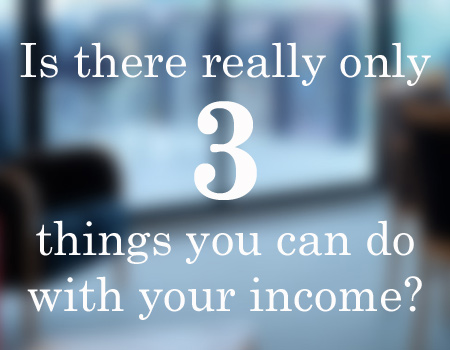As a nation and as individuals the main economic problem we face is scarcity.
We have essential needs but we have unlimited wants and most of us have limited resources or income to satisfy those. Our dilemma forces us to make choices. As rational human beings it’s assumed that we all try to allocate our scarce resources to our competing wants to maximise our satisfaction. We are all economists!
In theory national economic management is formulated to achieve what’s known as ‘allocative efficiency’ that is, producing the best mix of goods and services with the most efficient combination of resources with the least waste and with all resources fully employed. Like anyone knows we “can’t have it all”, there are trade-offs with any choice we make. The real or opportunity cost of a choice is the opportunity foregone, it’s true on a national level and a personal one.
Your income (Y) is the resource you have at your disposal to satisfy your wants and needs and there’s 3 things you can do with your income:
Y = C + S + T
- You can spend it (C)
- You can save it (S)
- You can pay taxes (T)
There are no other alternatives! Most people have the T taken out automatically before they get to make any choices about consuming or saving. What you are left with is disposable income. Saving by definition is “refraining from current consumption” and if you are fortunate enough to be meeting all your essential needs and still have some income available, you have the opportunity to decide how you will allocate your income from that point on. Unless you hoard the savings under the bed, you have the opportunity to invest and create wealth for the future. So, you can choose how to employ the savings!
In Australia 62% of all wealth is held by only 20% of the population, but unlike in other parts of the world, it isn’t primarily inherited, it’s created. It’s created by motivated people who think differently about money and debt. They don’t just work for their money, they make their money work for them and they understand that productive debt is not a bad thing.
Most people don’t realise how affordable and possible it is to invest. The opportunity cost, what you have to refrain from consuming now, may be less than you think and investing in property, particularly new property, is incentivized through the tax system, so while you can’t avoid the T component in the income equation, you can reduce it!
The first of the Seven Habits of Highly Effective People by Steven Covey, is “be proactive” – take what steps you can now to change your life for the better. You have the opportunity to achieve ‘allocative efficiency’, minimize waste and employ all your resources for maximum benefit.





Recent Comments